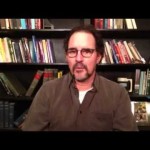We run our website the way we wished the whole internet worked: we provide high quality original content with no ads. We are funded solely by your direct support. Please consider supporting this project.
How can people who believe the open view trust a God who doesn’t control the future and doesn’t know for sure what will happen?
It’s true that according to the open view of the future things can happen in our lives which God didn’t plan or even foreknow with certainty (though he always foreknew they were possible). In this view, trusting in God provides no assurance that everything that happens to us will reflect his divine purposes, for there are other agents who also have power to affect us, just as we have power to affect others. This is for some a scary thought. But several considerations will put this fear in perspective.
First, how is the scariness of a view relevant to whether or not it’s true? There is no reason to conclude that something is true to the extent that it conforms to our wishes. Indeed, in this case the fact that the open view doesn’t conform to what we might wish were true actually provides one more reason for thinking that it is true, for as a matter of fact, reality rarely conforms to our wishes. If we are honest, our core belief about the world—manifested not by what we say but by what we do—is that this world is sometimes a scary place. Whatever view of God people might embrace, they still lock their doors at night. In other words, if we’re honest with ourselves, we all act as if the open view is true, regardless of what else we might theoretically believe.
Second, I do not see how affirming an all-controlling God provides any real comfort in the face of the frightening aspects of the world. Suppose there has been a string of assaults in your neighborhood. You are understandably concerned about your safety and the safety of your children. How does believing that every aggravated assault was ordained by God help you cope with this fear? It would still be a good idea to buy a padlock for your door and bars for your windows. You still know, at the core of your being, that the world is just as scary with your belief as without it. So what advantage is your belief?
I submit that your belief actually makes the world a scarier place, for two reasons. First, if God controls criminals and these criminals victimize godly and ungodly people alike, then it just might be that God has sovereignly decided to have one of these criminals victimize you and your family. And if God has ordained their brutality toward you, there is nothing you can do about it. Secondly, if God is the sort of God who is capable of ordaining such evils, then what is the basis of your trust in God?
If God doesn’t control all things, however, then there is something you can do about it. As a morally responsible free person you can make choices that maximize your safety and minimize your vulnerability against other people who choose to do evil. The world is perhaps still scary, but less so than if the Creator himself had the kind of character that made him willing to ordain aggravated assaults and the power to ensure that what he ordains will certainly be accomplished.
Some people are strangely inconsistent on these matters. A lady one time said to me that she didn’t know how she’d cope if she couldn’t trust the salvation of her children to “the God who knows the future.” I asked her how she was so certain God foreknew they were going to be saved. If God knows her children may or may not choose to be in relationship with him, there’s something they and their mother can do about it. But if their future has been eternally pre-settled, then there’s nothing to “trust” God for, and there’s not a thing anyone can do about it.
Finally, and most importantly, in the face of a scary world, the open view offers the same comfort the Bible offers. The open view affirms that God’s character is unambiguously loving and thus he doesn’t ordain evil. The open view affirms that, regardless of what happens to you, your eternal relationship with the Lord is secure (Rom. 8:31–39). The open view affirms that Christ will provide peace that passes understanding no matter what your circumstances may be. The open view affirms that no matter what comes to pass, God is always working to bring a redemptive purpose out of all situations (Rom. 8:28). And, precisely because the open view holds that the future is in part not settled, it can affirm that God can foresee future possibilities that are evil and do something about them. By contrast, if the future is eternally pre-settled, there’s nothing God or humans can do.
Category: Q&A
Tags: Open Theism, Q&A
Topics: Open Theism, Providence, Predestination and Free Will
Related Reading

Open Theism and the Nature of the Future
In this philosophical essay Alan Rhoda, Tom Belt and I argue that the future cannot be exhaustively described in terms of what will and will not happen, but must also be described in terms of what may and may not happen. The future, in other words, is partly open. The thesis is defended against a…

Free Will: What is a free agent?
What does it really mean to be a free agent? In this reflection, Greg offers some thoughts on free agents and how it can be that they are not exhaustively determined.

My Car Crash and the Open View
Last Saturday night Shelley and I were involved in a rather serious four car crash on a local highway. One person was hospitalized, and I’m being treated for neck pain and an on-going dull headache. But thankfully, no one was critically injured. In any event, the crash inspired several folks to e-mail or tweet questions…

Does God Exist Outside of Time?
Our friend Jeremy Jernigan wrote something recently that we wanted to share with you today. Jeremy is the author of Redeeming Pleasure and Teaching Pastor at Central Christian Church in Arizona. He blogs regularly at TomorrowsReflection.com. He’s the husband to Michelle and dad to five amazing little kids. You can connect with him on Twitter,…

Isn’t Open Theism outside of historic orthodoxy?
The Church has never used one’s view of divine foreknowledge as a test for orthodoxy. And while the open view has always been a very minor perspective, it has had its defenders throughout Church history and it has never been called “heresy” (until in mid 1990s when some started using this label). According to some…

Dealing With Objections to Open Theism, Part II
There are four major objections to Open Theism. In this post, we are dealing with the third and fourth. (See yesterday’s post to read about the first two.) Objection #3: God cannot foreknow only some of the future. It is often argued that for God to be certain of anything about the future, he must be…
